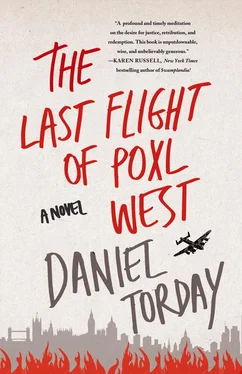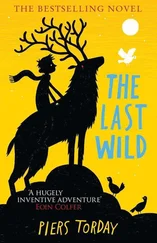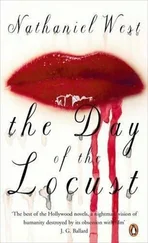I was going home.
12.
Soon after my return to the little flat near Bermondsey I found that while I’d not fully recovered from the effects of the tempest, and didn’t have energy enough yet to travel far from the flat, neither was I constitutionally suited to spending my time in idle convalescence. The period after my stint in the Royal Air Force I longed for Mother, Elbe, Father, Radobyl, youth. I didn’t talk to many people: What life I’d created for myself in London before I left for the RAF was almost entirely gone. Glynnis, Clive, even John Gallsworthy — nothing of it was left.
Only Françoise might possibly have survived.
The Nazis had started a harrowing ground and air war on London, indiscriminately firing V-2 rockets at Allied targets. Although the Luftwaffe didn’t send their aeroplanes overhead to bomb in those days as they had in the Blitz, for a period there was an even greater fear of annihilation. People had ceased going out to pubs, even to their work.
Then, as suddenly as they’d started, the Luftwaffe attacks stopped. We didn’t hear V-2’s tearing across London. Quiet blanketed the city. Throughout April, we heard radio reports that the Reich would give up. One day people even began hasty celebrations, only to learn from the Beeb that it was a false hope. The continuation of the war after that felt somehow even worse for the brief reprieve.
One afternoon during that period, when I found my energy returned in the afternoons and I was up to traveling greater distances, I purchased a train ticket and rode east out of the city toward Kent. Outside my window I saw the same water in the fields. The ground was torn up to a far greater extent than even the last time I’d gone past. V-2’s had flown indiscriminately from Holland, and while many of the rockets had found their way to London, many had bored their way into the ground here. I did my best to focus on those patches where the grass was still green, saved from arbitrary destruction.
When I arrived I walked deep into the woods. It was a drier season than the last time I’d been to visit Mrs. Goldring. Midges were scarcer. The walk felt longer than it had those days with Glynnis. Soon enough I was at the mouth of the cave. I did not hear the murmur of voices until I was upon them. In the big chamber at front of the cave, there were maybe two dozen people milling about. I didn’t want to talk to any of them and so proceeded deep into the cave, hoping only to achieve the room I sought.
Back in the living area where I’d once sat with Glynnis Goldring’s mother I found the one thing I would hope not to find, again and again, in the coming months and years:
Nothing.
The room had been vacated. No pallets on the floor. No white bedding for Mrs. Goldring to lie upon. There was no one there even to ask. I realized that Perhaps I’d find no evidence of Glynnis’s mother, either.
For the next hour I walked around that huge cave. In some rooms I would find groups talking in a low hush. At each I inquired after Mrs. Wilma Goldring, the old woman who suffered dementia, whom I’d come to visit those months before.
No one seemed to know of her. Soon enough I found myself quite lost. After maybe half an hour, I heard voices again — I’d come upon that same group I’d first encountered before finding Mrs. Goldring’s room empty. I was leaving when I saw someone new had joined their group, an old man who looked familiar, though it was very hard to say — there had been thousands of denizens of that cave in the days when I last visited it. Each face as it passed me then was obscured by shadow. I asked this old man if he knew of Mrs. Goldring.
“Wilma Goldring,” he said. In the cold, damp dark, all that was visible of his face were just the wisps of a white beard poking from his cheeks. “I’ve known that name since I was a much younger man than you.” This was the elder brother of old Mr. Lovelace, whom Mrs. Goldring had spoken of when I first met her, fearing that he might “take liberties” with her deep in that cave. The coincidence of meeting him here felt providential. But he followed with the news:
Mrs. Goldring had passed a couple months earlier.
“Her daughter succumbed to the Blitz, you know,” he said. He looked at me. “But yes, of course you knew.” He told me Mrs. Goldring had taken it hard when she lost Glynnis. Living in those damp caves can’t have helped. It seemed once again there would be no ceremony to accompany a loss. But as I turned to depart, the old man said, “Are you the Czech boy she used to speak of? Floxin or something.”
I told him that I was, in fact. Poxl. Poxl West. Weisberg. West.
He asked me to wait there a moment. He absconded somewhere deep within the cave. Minutes later he returned. In his hand was Mrs. Goldring’s Copy of Shakespeare. It was still covered in that oilcloth that protected it from the cave’s damp. It was more worn than when I’d last read from it, but I recognized the book as I would have her daughter’s face.
For the first time during that period, some remnant of loss had been left behind.
“She wanted you to have it,” he said. I thanked Mr. Lovelace’s brother and departed.
When I returned to the light outside that cave I sat down. Mrs. Goldring had not inscribed the book as I’d hoped she might have I thumbed through the thin, crinkling pages, and saw she’d taken notes in her last days. I opened to King Lear. There I saw where she’d penned in our parts:
Next to each Lear speech, she’d written in “Pocksall,” and next to each of Cordelia’s, “Me.”
I cannot describe the hope seeing these inscriptions instilled in me. For the first time since I’d left Rotterdam, some evidence remained of someone I’d lost. She’d been thinking of me, recording my name in the margins. This edition of the plays would come to supplant the one Niny had gifted me when I was in hospital. It was the edition I would read for the rest of my days.
13.
At the end of the first week in May, on what has come to be known as V-E Day, the streets filled with people. The youth in our neighborhood took to the streets, hung out their windows and threw ripped paper onto one another.
I stayed inside and drew the blackout curtains. Only one of those people I’d come to love in those years since I first left my father’s house in Leitmeritz might still be alive. I had to find out.
The war in Europe was over.
My war was far from over.
One day not long after that, I overheard Johana ask Niny when she thought I would find my own living arrangement. After the intimacy of our Hanukkahs and the Elbe-swimming days of our youth, I had come to expect Niny to support me no matter the circumstances, and at first I took her lack of immediate response as an affront. After listening further I came to see that Niny did have my best interests in mind. She suggested she would speak with me. When she knocked on my door late the following afternoon and suggested we take a walk, I found our conversation was not primarily to concern the state of my affairs.
Over the previous six months, Niny explained as we walked past the open façades of buildings and scarred plane trees, she had been seeing a Spitfire pilot she met at an NAAFI function in a country house near Wiltshire, where she and her fellow WAAFs were billeted. This man was named Thomas Paxton. He was twenty-five, raised in West London.
“On our first weekend pass in common, we drove all the way to Dover,” Niny said, “where he walked me along the edge of those cliffs and asked after our home.” She explained she had never before had the odd feeling she had for this Thomas Paxton. He was an avid and well-versed student of European history. Inquiring after her accent, he discovered she had been raised in Leitmeritz. He had traveled to Prague on several occasions, had traveled across Bohemia. On their first outing together, he described in detail the oxbow that bent around Czesky Krumlov, the medieval castle that rose majestic above its river; trips he’d made down to the spas at Karlovy Vary; the gray stone of the Charles Bridge passing over the Vlatava. He had gone swimming in the Elbe, and appeared to understand those feelings we’d experienced as children.
Читать дальше












